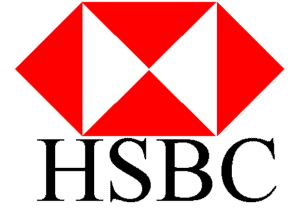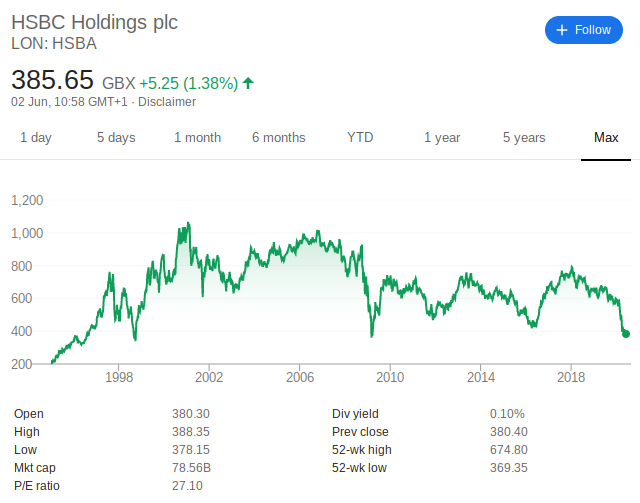How to Buy HSBC Shares Online in the UK
Looking to buy HSBC shares in the quickest and most cost-effective way? If you’re based in the UK, there are lots of FCA regulated online stock brokers that allow you to do this with ease. Some platforms even offer commission-free investments, so it’s only the spread that you need to look out for.
In this article, we show you how to buy HSBC shares in the UK. On top of exploring the best UK brokers to buy HSBC stocks from, we also give you a handy step-by-step walkthrough.
As HSBC is a global financial institution with locations across the globe, the company has two primary listings – the London Stock Exchange and the Hong Kong Stock Exchange. As such, you simply need to sign up with a UK broker that is regulated by the FCA. With hundreds to choose from, it is important to make considerations on dealing charges, annual fees, supported payment methods, and minimum account balances. Within this in mind, below you will find our three top-rated UK stock brokers to buy HSBC shares from. An additional option that is worth considering is ‘trading’ HSBC share CFDs. This means that you will be targeting short-term stock price movements. Plus500 excels in this particular investment space, with more than 2,000 stock CFDs hosted at the platform. For those of you that haven’t come across CFDs before, they essentially allow you to speculate on the future price of an asset without you taking ownership. This comes with a number of benefits, such as being able to trade HSBC share CFDs with leverage of up to 1:5 (and more on other asset classes). This means that a £500 balance would permit a maximum trade of £2,500. Plus500 also allows gives you the option of placing buy/sell positions on HSBC share CFDs, meaning you can speculate on stock price going up and down. If you do like the sound of trading HSBC stock CFDs, it takes just minutes to get started at Plus500. You can deposit a minimum of £100 with a UK debit/credit card, bank account, or e-wallet. Best of all, Plus500 does not charge any trading commissions at all. This means that the only fee you will end up paying is the spread. Deposits and withdrawals are free too, which is great. In terms of safety, Plus500 is publicly listed on the London Stock Exchange. Plus500UK Ltd is authorized & regulated by the FCA (#509909). 72% of retail investors lose money trading CFDs at this site This is reduced to an industry-leading £3 per trade if you place three or more buy/sell orders in the previous month. At the other end of the spectrum, HSBC shares can be traded on a commission-free basis when utilizing CFDs. You will also have the option of applying leverage, as well as short-selling. In terms of the broker’s reputation, IG was launched way back in 1974. It has since amassed more than 174,000 client accounts, and it holds licenses with the FCA and ASIC – among others. IG is also worth considering if you want access to top-notch research materials. This includes heaps of handy guides and ‘how-to’ explainers, alongside technical and fundamental analysis tools. Outside of its main share dealing and CFD divisions, IG also offers a spread betting platform. This will allow you to trade HSBC stocks without paying any capital gains tax on your profits. This includes the London Stock Exchange and the Hong Kong Stock Exchange. This means that forms part of both the FTSE 100 and Hang Seng index. In terms of the company’s stock market performance, this has been somewhat up and down over the past two decades. For example, the bank enjoyed an extremely bullish period in the years between 1995 and 2001 – where its stocks hit an all-time high of just over 1,000p. HSBC was hit particularly hard by the financial crisis of 2008, where its share lost close to 50% in the space of 12 months. Fast forward to mid-2020 and the bank is hovering around the 400p-mark. To add salt to the wound, HSBC recently announced that it would be suspending dividend payments. Although the bank has noted that it plans to review this after its full-year results, it remains to be seen when stockholders will once again be in receipt of dividends.. HSBC hasn’t been in the best of shapes in recent years. Not only has its operating margin been under constant strain, but it was at the forefront of a multi-billion money laundering scandal that went as far as an SEC committee hearing. Add in the fact that HSBC recently suspended all dividend payments, and it does make it somewhat difficult to make a case for the financial institution. Nevertheless, below we have listed some of the reasons why you might consider buying HSBC shares today. Although the retail and commercial side of the business has been struggling as of late, HSBC is seeing excellent results in its investment bank division. The good news for shareholders is that the bank makes its money fee (as opposed to the financing interest). When you factor in the turbulent market conditions that COV-19 has presented, this is hugely beneficial for HSBC – at least in its investment banking department. Looking at the wider picture, it is true that HSBC is now worth just a fraction of its prior all-time peaks. Although it might never regain its former glory on the London Stock Exchange, it is more than reasonable to suggest that it can recover its COV-19 related dips. Taking a closer look at the charts, HSBC shares were priced at just under 600p in January 2020. At the turn of June, this went as low at 380p – subsequently resulting in a dip of 36%. If we were to flip the figures around, a return to 600p would result in gains of 57%. This represents a significant upside for a bank that – like the rest of the financial institution space, could not predict just how serious of the pandemic would be. It is somewhat challenging to make a strong case for HSBC. While we appreciate that the financial institution was hit hard by the financial crisis of 2008 – much of the UK retail banking space has since recovered. However, HSBC’s stock market woes date all of the way back to 2001 – which is when its shares last hit an all-time high. While few from within the industry would make a case for HSBC returning to 1,000p+ territory, a more realistic target is that of getting back to pre-COV-19 levels. If it can, investors are potentially looking at an upside of 57%. On the flip side, there is no knowing when HSBC will resume its long-standing history of paying dividends, so this is something that must also be considered. Nevertheless, if you feel that HSBC shares can currently be purchased on the cheap, we would suggest exploring one of the UK stock brokers that we have discussed on this page.
HSBC shares have been struggling for a long time. In fact, the company last hit a stock market peak n 2001. With that said, the financial institution is still one of the largest banks in the world, with more than $2.5 trillion worth of assets under management. As such, some wuld argue that at current prices - HSBC shares could be a viable investment.
HSBC is actually a dual-listed company that is hosted on the London Stock Exchange and the Hong Kong Stock Exchange. This ensures that the bank retains its dominance of the Asian banking sphere.
HSBC had a long-standing track record of rewarding shareholders with regular dividends. That was until the coronavirus pandemic came to fruition, as HSBC management recently announced it would be suspending dividends until further notice.
Although the bank is UK-based, HSBC actually stands for Hongkong and Shanghai Banking Corporation.
Yes, but you will need to use an online broker that gives you access to UK stock CFDs. The likes of Plus500, and IG all offer HSBC stock that you can short-sell with leverage of upto 5x. Kane Pepi is a British researcher and writer that specializes in finance, financial crime, and blockchain technology. Now based in Malta, Kane writes for a number of platforms in the online domain. In particular, Kane is skilled at explaining complex financial subjects in a user-friendly manner. Academically, Kane holds a Bachelor’s Degree in Finance, a Master’s Degree in Financial Crime, and he is currently engaged in a Doctorate Degree researching the money laundering threats of the blockchain economy. Kane is also behind peer-reviewed publications - which includes an in-depth study into the relationship between money laundering and UK bookmakers. You will also find Kane’s material at websites such as MoneyCheck, the Motley Fool, InsideBitcoins, Blockonomi, Learnbonds, and the Malta Association of Compliance Officers. WARNING: The content on this site should not be considered investment advice and we are not authorised to provide investment advice. Nothing on this website is an endorsement or recommendation of a particular trading strategy or investment decision. The information on this website is general in nature, so you must consider the information in light of your objectives, financial situation and needs. Investing is speculative. When investing your capital is at risk. This site is not intended for use in jurisdictions in which the trading or investments described are prohibited and should only be used by such persons and in such ways as are legally permitted. Your investment may not qualify for investor protection in your country or state of residence, so please conduct your own due diligence or obtain advice where necessary. This website is free for you to use but we may receive a commission from the companies we feature on this site. Buyshares.co.uk provides top quality insights through financial educational guides and video tutorials on how to buy shares and invest in stocks. We compare the top providers along with in-depth insights on their product offerings too. We do not advise or recommend any provider but are here to allow our reader to make informed decisions and proceed at their own responsibility. Contracts for Difference (“CFDs”) are leveraged products and carry a significant risk of loss to your capital. Please ensure you fully understand the risks and seek independent advice. By continuing to use this website you agree to our privacy policy. Trading is risky and you might lose part, or all your capital invested. Information provided is for informational and educational purposes only and does not represent any type of financial advice and/or investment recommendation. Crypto promotions on this site do not comply with the UK Financial Promotions Regime and is not intended for UK consumers. BuyShares.co.uk © 2026 All Rights Reserved. UK Company No. 11705811.
Step 1: Find a UK Stock Broker
1. Plus500 – Trade HSBC Stock CFDs with Low Spreads

Pros
Cons
3. IG – Trusted UK Share Dealing Platform With Competitive-Fees

Pros
Cons
Overview of HSBC Shares

Reasons to Buy HSBC Shares
Investment Bank Division Continues to Thrive
COV-19 Dip Could Recover
The Verdict
FAQs
Is HSBC a good investment?
What stock exchange is HSBC listed on?
Does HSBC pay dividends?
What does HSBC stand for?
Is it possible to short-sell HSBC shares?
Kane Pepi

